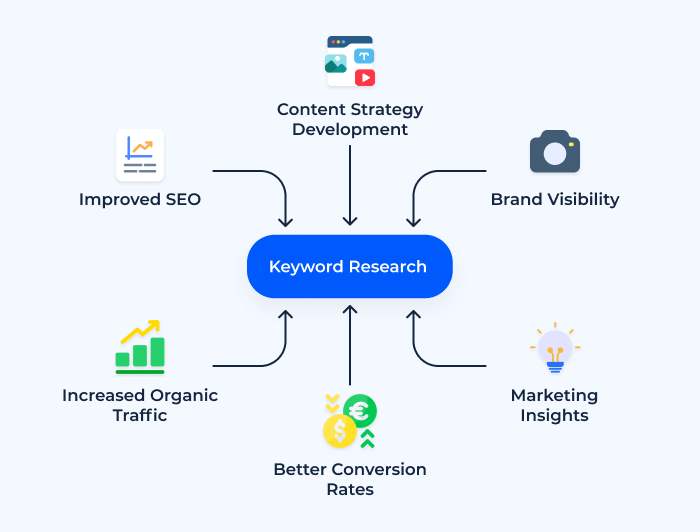The Role of Keywords in Successful SEO Campaigns
- Muntaha Murad
- Oct 14, 2025
- 4 min read
Search engine optimization (SEO) is the backbone of digital marketing and is essential for enhancing a website's visibility on search engines like Google and helping businesses attract more customers.
A key element of any successful SEO strategy is keywords and their use of keywords. A website's search engine optimization relies on keywords since they connect user search intents with site content. These phrases and terms represent "Search Query," which people enter into search engines to find information and products.
A well-structured SEO campaign relies heavily on effective keyword research and utilization to enhance visibility, drive organic traffic, and ultimately achieve business goals.
In this blog, we’ll explore the role of keywords in SEO campaigns, the types of keywords you should use, and how to incorporate them effectively. We'll also share some of the latest statistics about keywords and their impact.

What Are Keywords in SEO?
Keywords are the words and phrases that connect your website’s content with what users are searching for online. For example, if someone searches for “search engine optimization services,” they’re looking for companies or resources that can help improve their website’s rankings on search engines like Google.
Search engines use keywords to understand the relevance of your content and rank it accordingly. By targeting the right keywords, you can ensure your content reaches the right audience.
Types of Keywords
Using a variety of keywords is essential for a well-rounded SEO campaign. Understanding the different types of keywords can help in crafting a more effective SEO strategy:
Here are the main types:
Short-Tail Keywords:
These are short and general phrases, usually one or two words long, like "SEO services" or "digital marketing." They have high search volumes but are highly competitive and less specific.
Long-Tail Keywords:
Longer and more specific phrases, such as "best search engine optimization services" are more specific and have lower competition. These often attract users closer to making a decision and often lead to higher conversion rates due to their specificity.
LSI (Latent Semantic Indexing) Keywords:
These are terms related to the primary keywords, helping search engines understand the context of the content. For example, for the main keywords “SEO tools,” “website rankings,” or “Google algorithm.”
Geo-Specific Keywords:
These include location-based terms. Local keywords like “SEO services in New York” are vital for businesses targeting a specific location.
Also Read Here: Benefits of ST Loise SEO
Importance of Keywords in SEO Campaigns
Keywords play a vital role in various aspects of SEO:
1- Driving Organic Traffic:
Optimizing content with relevant keywords and targeting the right keywords can significantly boost your website’s visibility in search results, driving more visitors to your site. According to recent data, 53% of all website traffic comes from organic search.
2- Understanding User Intent:
Keywords help you align your content with what users are looking for, whether they want information, a product, or a service. Analyzing the keywords that users employ helps in understanding their needs, and navigating to a specific site.
3- Improving Conversion Rates:
Targeting specific long-tail keywords can lead to higher engagement and conversions, as they often align closely with what users are seeking. Well-targeted keywords often attract users who are ready to take action, whether that’s making a purchase or booking a consultation.
4- Supporting Content Creation:
Keyword research helps you create content that addresses your audience’s needs and interests, keeping them engaged and coming back for more.
Also Read Here: Improve your site ranking with SEO Services

Keyword Research: The Backbone of SEO
Keyword research ensures you’re targeting terms that your audience actually uses, helping you avoid wasting time on irrelevant content. Effective keyword research is essential for a successful SEO campaign:
1) Steps in Effective Keyword Research:
Identify Your Audience: Understand their needs and pain points.
Use Tools: Platforms like Google Keyword Planner, Ahrefs, and SEMrush can help you find relevant keywords.
Analyze Competitors: See what keywords your competitors are targeting to identify gaps and opportunities.
2) Key Metrics to Consider:
Search Volume: The number of times a keyword is searched.
Keyword Difficulty: How hard it is to rank for a keyword.
Cost-Per-Click (CPC): Useful for understanding the commercial value of a keyword.
Relevance: How closely a keyword matches your content and audience intent.
3) Integrating Keywords into Your SEO Strategy
Once you've identified the right keywords, it's important to integrate them effectively:
On-Page Optimization:
Place keywords strategically in:
Page titles
Headings (H1, H2, etc.)
Meta descriptions
Image alt tags
URL structures
Maintain natural keyword density to avoid overstuffing, which can lead to penalties.
Content Optimization:
Use keywords naturally within your blog posts, product descriptions, and other content.
Balance primary and secondary keywords to maintain relevance.
Incorporate keywords naturally within the content.
Use a mix of primary and secondary keywords to enhance relevance.
Off-Page Optimization:
Use keywords in anchor text for backlinks to improve authority and relevance.
Technical SEO:
Ensure keywords are part of URL structures and schema markup to aid search engine understanding.
4) Common Mistakes to Avoid
Be mindful of these common pitfalls:
Keyword Stuffing: Overloading content with keywords can lead to search engine penalties.
Targeting Irrelevant or Overly Competitive Keywords: Focus on keywords that are relevant to your audience and within reach in terms of competition.
Neglecting to Update Keyword Strategies: Regularly revisit and update your keyword strategy to stay aligned with changing search trends.

The Future of Keywords in SEO
The landscape of SEO is continually evolving:
Voice Search
With the rise of voice search, conversational queries like “Where can I find search engine optimization services near me?” are becoming more important.
User Intent and AI
Search engines are increasingly focusing on understanding user intent. Keywords that match specific intents will remain critical.
Conclusion
Keywords are the foundation of any successful SEO campaign. They drive organic traffic, improve conversions, and guide your content strategy. By conducting thorough keyword research and integrating keywords effectively, you can boost your website’s visibility and achieve your business goals.
If you’re looking for professional search engine optimization services, start by evaluating your keyword strategy and making data-driven adjustments. Remember, the right keywords can make all the difference!





